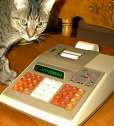Over the past 30-plus years, an incredible number of electronic calculators were made around the world. For a casual collector/enthusiast like myself, it is important to somewhat limit the scope of our interest, otherwise we'd soon be overwhelmed.
In my case, my attention had an obvious focus: programmable calculators. Non-programmable models are of little or no interest to me (with a few notable exceptions.) However, even the term "programmable calculator" is an imprecise one that may include devices I'm not particularly interested in.
For instance, it includes a number of early desktop calculators such as the HP-9100, or early models from Wang, Commodore, and others. These machines are very interesting, to be sure, but their sheer bulk makes them quite impractical from a collector's point of view. I actually enjoy fiddling with my old machines, which is rather inconvenient when said old machine weighs 50 pounds and needs to be hauled up from the basement before I could turn it on.
On the other hand, I don't want to limit my interest to "pocket" calculators either, as that would not only exclude the classic HP-97 but also those portable marvels made by Compucorp, such as the 324G.
Another question concerns the word "calculator". Programmable calculators are "almost computers." But exactly where's the boundary between the two? Is a calculator that's programmable in BASIC a computer? What if it can also be programmed in assembly language? I'm not interested in collecting portable computers (I don't want to end up with a collection of PC-compatible notebook machines, for instance) but where do you draw the line?
At one point, I thought I had it easy: why don't I just focus on calculators with a light-emitting (LED or vacuum/plasma fluorescent) display? But then I received an HP-16C that has an LCD readout. There was no way I would exclude this marvel from my collection! So how about limiting my interest to calculators with a segmented, numeric only display? But no... that would not only exclude the HP-41 (with its beautiful 14-segment alphanumeric display) but also calculators like the HP-28/48 that have graphical LCD displays.
So this is how it came to be that I now define my field of interest to cover portable, programmable electronic calculators. The words in this phrase have a precise meaning:
Portable means that the calculator must operate from battery power. This includes devices with rechargeable batteries as well as low power consumption units in which the battery lasts months or years.
Programmable means that the calculator must have a facility to "memorize" keystrokes, be it something as simplistic as the Litronix 2290 with its 10-step memory, or the HP-48SX with its elaborate object-oriented language, RPL.
Electronic: well, the meaning is obvious. I have no idea whether there have been mechanical or electromechanical calculators with program capability ever made, but I doubt any of them were portable anyway!
Calculator: the primary function of the device must be floating point calculation. It must have a numeric keypad with at least the ten number keys and keys for the four basic operators. It must be capable of performing simple calculations using these keys in its default operating mode, or it should be trivially easy to place the device in this calculator mode of operation.
There are, of course, exceptions. Even this seemingly exact definition of the word "calculator" is somewhat suspect. For instance, if you boot up a vintage IBM PC (with the BASIC ROMs installed) its BASIC interpreter will start; you'll be able to enter calculations from the numeric keypad and see instant results on the screen. Does this mean that the IBM PC is a calculator?
On the other hand, there's the Texas Instruments SR-60, for instance; clearly an AC-only device, but it's also very definitely a calculator, a desktop "big brother" to the TI-59 (and possibly, to the never released TI-88.) Since I actually hauled one of these around in Hungary back in 1981, I certainly wouldn't want to exclude it from my collection, even though it's difficult to justify why this machine is included whereas others (e.g., the HP-9810) aren't.
But in the end, it is the collection that serves my needs and interests, not the other way around. If I want an SR-60 in there, I'll have one, no matter whether it "belongs" there or not. What matters is that this machine brings back a lot of memories. Which is what got me into collecting these beasts in the first place...


